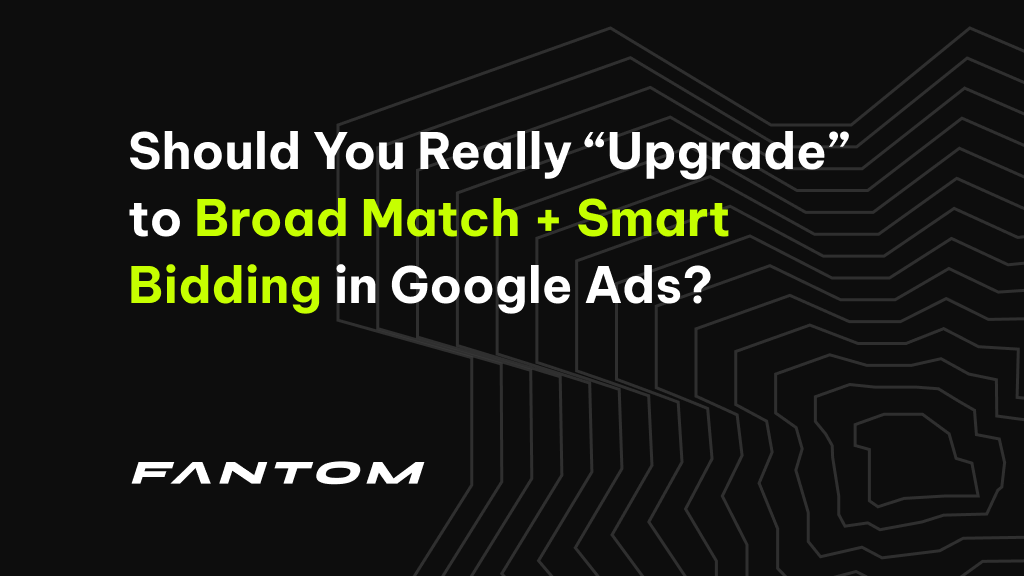Google has been pushing the upgrade to Broad Match + Smart Bidding for quite some time now. But we at Fantom believe that the push might be misleading for the new advertisers. Let’s explore why we think so.

Google Ads is undoubtedly one of the most popular PPC platforms to date. Thanks to its sophisticated algorithm, it tops the list with over 28% market share in digital advertising. Nearly all the websites/publishers are part of their network -making it the best choice for advertisers who want to reach a large audience.
Google is constantly improving and tweaking its Ad Keyword Matching. But recently, they have been pushing the new Smart-Bidding-Powered Broad Match system to all users. Instead of jumping on the bandwagon and just upgrading your keyword matching, we recommend trying a few things out. Because every new update has pros and cons, our guide can help you improve your Ad’s performance without risking it all on a so-called upgrade.
We will share some tactics you should try before opting for the upgrade. In addition, we will share some precautionary measures you should take before you go with the Smart-Bidding-Powered Broad Match in Google Ads.
A Quick Overview
Before we move ahead, here’s a quick overview of the keyword matching types in Google Ads. The following image is from Google and helps you understand the types of keyword matches available right now:

As you can see in the image, there are three broad types of keyword matching:
Broad-Match – with the highest reach of them all, is a type of keyword matching that shows your ad on searches related to your keyword.
Phrase-Match is the type of keyword matching that shows your ad on searches that include your keyword.
Exact-Match is the type of keyword matching that shows your ad on searches that are the same as your keyword.
Before you use Broad Match + Smart Bidding
Even though Google claims that Smart Bidding and Broad Match will improve the performance of your ads; we recommend trying out the following strategies before opting for it if you’re a beginner:
Dynamic Search Ads
Instead of your keywords, Dynamic Search Ads function off from your website. You only have to provide your website, and Google will automatically create ads from it and show them to people searching for similar items. The following infographic from Google showcases it quite elaboratively:

Even if the process is automated, the results are far better than the broad match. Although, there is an issue with scaling your ads that you might consider.
Phrase and Exact Match
If you want to try Smart Bidding with Broad Match, we recommend trying Phrase and Exact Match first if you did not.
The mistake most people make is that they start with Broad Match, and if they don’t see any success, they directly opt for Smart Bidding.
If You Opt for Broad Match + Smart Bidding
If none of the strategies worked for you, and you want to go with Smart-Bidding-Powered Broad Match – here are some tips you should keep in mind.
Start With a Tight Budget and Set Restrictions.
Starting without a budget and restriction in case of a Broad Match strategy can bleed heavily. It can not only decrease effectiveness but is deadly for your marketing budget. Therefore, it is clever to start with a tight budget and set restrictions on it.
Monitor Lead Quality
It goes without saying that when relying on an AI-powered system for your marketing, you must continue monitoring the output quality. It helps you optimize the campaign. And above all, it lets you assess your decision.
Monitoring your lead quality is not necessary for eCommerce companies, though. A sale is a sale! But for other companies, where the objective is to get your product in the right hands, you must monitor the lead quality if you opt for Smart Bidding with the broad match in Google Ads.
If you want to learn more about monitoring your lead quality and growth pace compared with your goals – check out our guide on the Lead Waterfall.
Have Enough Conversion Data
Smart Bidding can be great, and it can be full of crap. All the results you get from it depend on the Data you feed it. Expecting it to get your sales every second without having the Data is a sheer mistake.
If you opt for Smart Bidding, ensure that you have enough data. Having enough conversion data enables you to set expectations and assess the performance with better accuracy.







